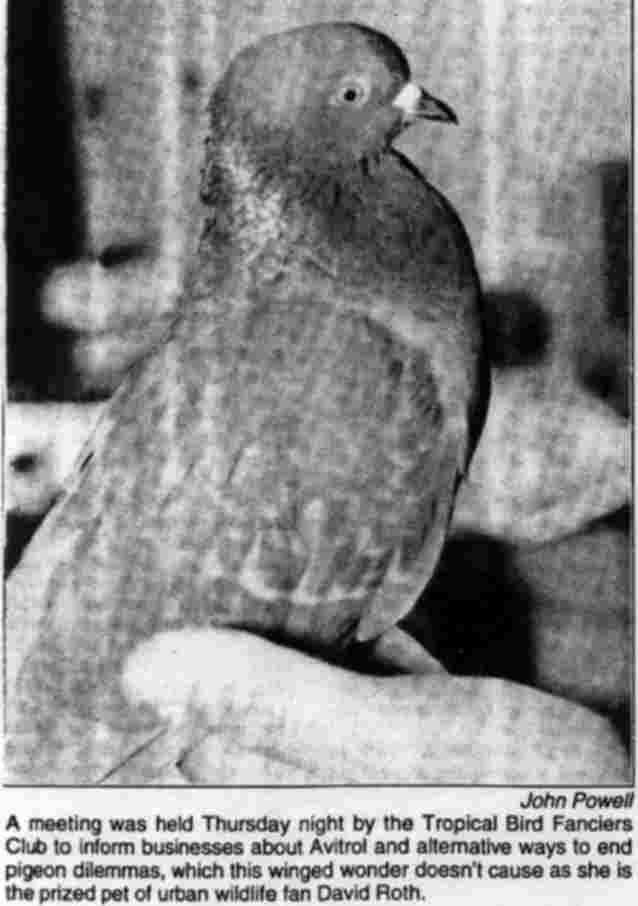|
Sunday, March 12, 1995  A
wing and a prayer A
wing and a prayer
Alternatives to poisoning pigeons urged By LISA DAVIS
While calling themselves the Tropical Bird Fanciers Club, a local organization is expressing a concern for more urban feathered friends. The club fears that pigeons in the Lake Havasu City area are being poisoned. In fact, members suspect that local businesses are using Avitrol, a poison developed by Phillips Petroleum, to stop the pigeons from landing on their business' roofs and window ledges. David Roth, founder of Urban Wildlife Society, said these businesses are being misinformed by pest control companies that claim Avitrol is only a disorientating agent not a poison. "Pest control companies are misrepresenting this agent," said Roth. "We have documentation that Avitrol kills the pigeons by first causing them to suffer seizures and then cardiac arrest." Roth said he has seen swarms of pigeons go into convulsions after eating the drug. A meeting was held Thursday night to inform businesses about Avitrol and alternative ways to end their pigeon dilemmas. Among those attending was Alex Ross, president of the Uptown Business Association. "The response was positive," said Ross. "David told us about alternate, inexpensive methods of keeping the birds off the roofs instead of poisoning them." Roth said the best way for businesses to control the situation is to make modifications to their buildings. "Businesses need to make the habitats unattractive to the pigeons," Roth said. "I suggest eliminating the nests, placing barrier coil on roofs or changing the angle of the window ledges so the birds can't land." Ross commented that he has already had success reducing the pigeon population near his business by trying some of Roth's suggestions. "These features you can add to your building are long (term) fixes instead of short term solutions like poison," said Ross. "Businesses must realize that birds reproduce. The best defense is to remove their nests." Richard Kramer, director of research and education for the National Pest Control Association, said he agrees with Roth's methods, especially that of nylon netting. "This material is easy to use and durable," said Kramer. "It can be integrated into the architecture of the structure." Roth said it is important for people to know that these tactics serve as a way to relocate the pigeon population to a more conducive environment. "Surviving birds eventually fall victim to wildlife like hawks," said Roth. For more
information on pigeon control, interested persons can call Pam Short, program
director for Tropical Birds Fancier's Club, at [520] 453-5131 or Mainstreet
USA at [520] 855-MAIN.
Click on one of the following underscored titles to go to that home page:
ANIMALS
| PIGEONS
| URBAN
WILDLIFE SOCIETY | AVIAN
AFFAIRS COALITION
|
|